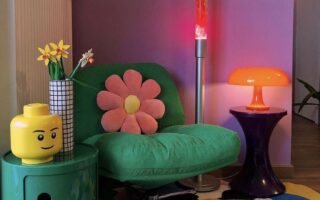We never think about it when we’re buying mirrors, but there is such a thing as a bad mirror, in the sense that it is a poor-quality mirror for a variety of desired effects, and a great mirror for only one or two strict purposes.
DEIOVWXS Lighted Makeup Mirror
here’s what sets the DEIOVWXS Lighted Makeup Mirror apart from regular mirrors:
- Precision for Makeup and Grooming: The 10x magnification side helps you see the tiniest details, like blending eyeshadow perfectly, shaping your brows, or spotting anything you’d miss with a regular mirror. A standard mirror can’t zoom in like this.
- Customizable Lighting: It mimics different light settings—natural, warm, and cool—so you can see how your makeup will look in various environments, whether it’s daylight, indoor lighting, or evening settings. Regular mirrors rely on whatever ambient light is available, which can be hit or miss.
- Portability and Cordless Use: The rechargeable battery makes it perfect for on-the-go use or for places without convenient outlets. You don’t get that flexibility with a regular mirror.
- Better Visibility Anytime: The built-in LED lights ensure you always have bright, even lighting, no matter the time of day or room lighting. Regular mirrors can’t promise good visibility in dimly lit spaces.
- Adjustable Angles: With the 360° rotation, you can angle the mirror exactly how you need it, whether you’re leaning in close or checking your profile. Regular mirrors usually don’t have this kind of movement.
you’re getting ready for a big night out, and you’re attempting a tricky makeup look that needs precision and balance—say a winged eyeliner. The tri-fold design lets you see your face from multiple angles without having to twist your neck or guess if both wings match. The side panels help you check symmetry, and the adjustable lighting ensures you aren’t missing a smudge.
It’s also a lifesaver when experimenting with contouring or blending eyeshadows. You can position the side mirrors to focus on different areas of your face, so you can check if your contour line is blending smoothly on both sides or if one eye is more dramatic than the other. It’s like having a 360° view of your work, which saves you time and frustration.
Even on regular mornings, this mirror comes in handy. Maybe you’re just popping on mascara and lipstick before a coffee run, but you want to make sure there’s no smudging or uneven application. Its versatile setup lets you glance from various angles quickly, so you step out confidently, knowing you look great.
FUNTOUCH Rechargeable Travel Makeup Mirror
Equipped with 72 LED lights, this portable mirror offers three color lighting modes and a dimmable touch screen. Its folding design makes it ideal for travel.
Picture yourself on vacation and you realize the hotel’s bathroom lighting is dim and unflattering, making it hard to do even simple makeup. This mirror, compact and rechargeable, slides easily into your luggage or carry-on. You pop it open, and suddenly you have perfect lighting and clarity to get ready, no matter where you are.
Or think about the time you’re on a weekend trip with friends, sharing one mirror in a crowded Airbnb. Instead of fighting for space, you whip out your portable mirror, set it up wherever there’s light, and finish your routine comfortably. It’s small, but its adjustable light modes mimic natural lighting, so you can avoid overdoing your makeup for a daytime outing.
It’s also perfect for commuters. If you’re someone who freshens up after the gym or needs to touch up makeup on the go, this mirror fits in your work bag and stays charged. No more using blurry reflections on your phone screen to fix a stray mascara clump.
Professional 8.5″ Large Lighted Makeup Mirror
This mirror boasts 1X/10X true HD magnification with three color dimmable lights. It features 80 shadowless LEDs and a 360° swivel design for optimal use.
Say you’re prepping for a wedding or a formal event where your makeup needs to be on point. This mirror’s 10x magnification helps you nail every detail, from applying false lashes to ensuring your eyeliner wings are flawless. With the larger surface, you don’t feel restricted—it’s like having a professional setup at home.
It’s also useful for skincare. Maybe you’ve decided it’s time to do a deep clean of your pores or apply a precise layer of serum to targeted spots. The magnification and clear lighting make it easy to see exactly what you’re doing, reducing mistakes or over-application.
Even daily tasks like shaping your eyebrows or checking for stray hairs get easier with this mirror. Instead of struggling with bad lighting and blurry close-ups in a regular mirror, you can zoom in confidently and finish the job faster and better.
HIEEY Hollywood Vanity Mirror with Lights
Offering three color lighting modes and a 5X magnification mirror, this product includes smart touch control and 360° rotation. It’s designed for a professional makeup experience.
VESAUR Professional 8.5″ Large Lighted Makeup Mirror
Conair Lighted Makeup Mirror
This LED vanity mirror provides 1X/10X magnification and comes in a satin nickel finish. It’s a corded mirror known for its durability and clear reflection.
Lighted Makeup Mirror with 20X Magnification
Featuring adjustable brightness and three color light settings, this two-sided mirror is suitable for detailed makeup application. It’s also detachable, making it travel-friendly.
deweisn Tri-Fold Lighted Vanity Mirror
This mirror features 21 LED lights, touch screen functionality, and 3X/2X/1X magnification. Its tri-fold design offers a comprehensive view, and it supports dual power supply modes for convenience.


